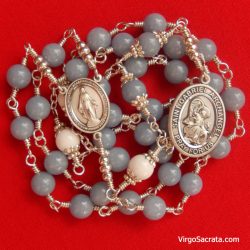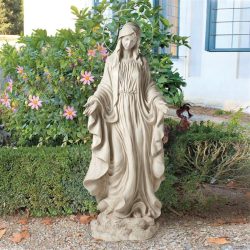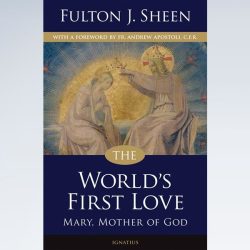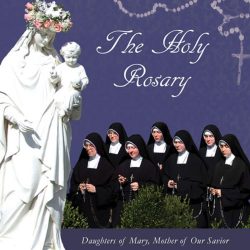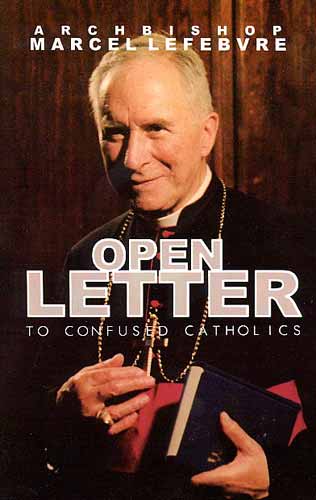
From “An Open Letter To Confused Catholics” by Archbishop Marcel Lefebvre, – A popular study of the crisis in the Church written for all to understand.
Indiscipline is everywhere in the Church. Committees of priests send demands to their bishops, bishops disregard pontifical exhortations, even the recommendations and decisions of the Council are not respected and yet one never hears uttered the word “disobedience,” except as applied to Catholics who wish to remain faithful to Tradition and just simply keep the Faith.
Obedience is a serious matter; to remain united to the Church’s Magisterium and particularly to the Supreme Pontiff is one of the conditions of salvation. We are deeply aware of this and nobody is more attached to the present reigning successor of Peter, or has been more attached to his predecessors, than we are. I am speaking here of myself and of the many faithful driven out of the churches, and also of the priests who are obliged to celebrate Mass in barns as in the French Revolution, and to organize alternative catechism classes in town and country.
We are attached to the Pope for as long as he echoes the apostolic traditions and the teachings of all his predecessors. It is the very definition of the successor of Peter that he is the keeper of this deposit. Pius IX teaches us in Pastor Aeternus: “The Holy Ghost has not in fact been promised to the successors of Peter to permit them to proclaim new doctrine according to His revelations, but to keep strictly and to expound faithfully, with His help, the revelations transmitted by the Apostles, in other words the Deposit of Faith.”
The authority delegated by Our Lord to the Pope, the Bishops and the priesthood in general is for the service of faith. To make use of law, institutions and authority to annihilate the Catholic Faith and no longer to transmit life, is to practise spiritual abortion or contraception.
This is why we are submissive and ready to accept everything that is in conformity with our Catholic Faith, as it has been taught for two thousand years, but we reject everything that is opposed to it.
For the fact is that a grave problem confronted the conscience and the faith of all Catholics during the pontificate of Paul VI. How could a Pope, true successor of Peter, assured of the assistance of the Holy Ghost, preside over the most vast and extensive destruction of the Church in her history within so short a space of time, something that no heresiarch has ever succeeded in doing? One day this question will have to be answered.
In the first half of the Fifth Century, St. Vincent of Lérins, who was a soldier before consecrating himself to God and acknowledged having been “tossed for a long time on the sea of the world before finding shelter in the harbor of faith,” spoke thus about the development of dogma: “Will there be no religious advances in Christ’s Church? Yes, certainly, there will be some very important ones, of such a sort as to constitute progress in the faith and not change. What matters is that in the course of ages knowledge, understanding and wisdom grow in abundance and in depth, in each and every individual as in the churches; provided always that there is identity of dogma and continuity of thought.” Vincent, who had experienced the shock of heresies, gives a rule of conduct which still holds good after fifteen hundred years: “What should the Catholic Christian therefore do if some part of the Church arrives at the point of detaching itself from the universal communion and the universal faith? What else can he do but prefer the general body which is healthy to the gangrenous and corrupted limb? And if some new contagion strives to poison, not just a small part of the Church but the whole Church at once, then again his great concern will be to attach himself to Antiquity which obviously cannot any more be seduced by any deceptive novelty.”
In the Rogation-tide litanies the Church teaches us to say: “We beseech thee O Lord, maintain in Thy holy religion the Sovereign Pontiff and all the orders of ecclesiastical hierarchy.” This means that such a disaster could very well happen.
In the Church there is no law or jurisdiction which can impose on a Christian a diminution of his faith. All the faithful can and should resist whatever interferes with their faith, supported by the catechism of their childhood. If they are faced with an order putting their faith in danger of corruption, there is an overriding duty to disobey.
It is because we judge that our faith is endangered by the post-conciliar reforms and tendencies, that we have the duty to disobey and keep the Tradition. Let us add this, that the greatest service we can render to the Church and to the successor of Peter is to reject the reformed and liberal Church. Jesus Christ, Son of God made man, is neither liberal nor reformable. On two occasions I have heard emissaries of the Holy See say to me: “The social Kingdom of Our Lord is no longer possible in our times and we must ultimately accept the plurality of religions.” This is exactly what they have said to me.
Well, I am not of that religion. I do not accept that new religion. It is a liberal, modernist religion which has its worship, its priests, its faith, its catechism, its ecumenical Bible translated jointly by Catholics, Jews, Protestants and Anglicans, all things to all men, pleasing everybody by frequently sacrificing the interpretation of the Magisterium. We do not accept this ecumenical Bible. There is the Bible of God; it is His Word which we have not the right to mix with the words of men.
When I was a child, the Church had the same faith everywhere, the same sacraments and the same Sacrifice of the Mass. If anyone had told me then that it would be changed, I would not have believed him. Throughout the breadth of Christendom we prayed to God in the same way. The new liberal and modernist religion has sown division.
Christians are divided within the same family because of this confusion which has established itself; they no longer go to the same Mass and they no longer read the same books. Priests no longer know what to do; either they obey blindly what their superiors impose on them, and lose to some degree the faith of their childhood and youth, renouncing the promises they made when they took the Anti-Modernist Oath at the moment of their ordination; or on the other hand they resist, but with the feeling of separating themselves from the Pope, who is our father and the Vicar of Christ. In both cases, what a heartbreak! Many priests have died of sorrow before their time.
How many more have been forced to abandon the parishes where for years they had practised their ministry, victims of open persecution by their hierarchy in spite of the support of the faithful whose pastor was being torn away! I have before me the moving farewell of one of them to the people of the two parishes of which he was priest: “In our interview on the… the Bishop addressed an ultimatum to me, to accept or reject the new religion; I could not evade the issue. Therefore, to remain faithful to the obligation of my priesthood, to remain faithful to the Eternal Church… I was forced and coerced against my will to retire… Simple honesty and above all my honor as a priest impose on me an obligation to be loyal, precisely in this matter of divine gravity (the Mass)… This is the proof of faithfulness and love that I must give to God and men and to you in particular, and it is on this that I shall be judged on the last day along with all those to whom was entrusted the same deposit (of faith).”
In the Diocese of Campos in Brazil, practically all the clergy have been driven out of the churches after the departure of Bishop Castro-Mayer, because they were not willing to abandon the Mass of all time which they celebrated there until recently.
Divisions affects the smallest manifestations of piety. In Val-de-Marne, the diocese got the police to eject twenty-five Catholics who used to recite the Rosary in a church which had been deprived of a priest for a long period of years. In the diocese of Metz, the bishops brought in the Communist mayor to cancel the loan of a building to a group of traditionalists. In Canada six of the faithful were sentenced by a Court, which is permitted by the law of that country to deal with this kind of matter, for insisting on receiving Holy Communion on their knees. The Bishop of Antigonish had accused them of “deliberately disturbing the order and the dignity of religious service.” The judge gave the “disturbers” a conditional discharge for six months! According to the Bishop, Christians are forbidden to bend the knee before God! Last year, the pilgrimage of young people to Chartres ended with a Mass in the Cathedral gardens because the Mass of St. Pius V was banned from the Cathedral itself. A fortnight later, the doors were thrown open for a spiritual concert in the course of which dances were performed by a former Carmelite nun.
Two religions confront each other; we are in a dramatic situation and it is impossible to avoid a choice, but the choice is not between obedience and disobedience. What is suggested to us, what we are expressly invited to do, what we are persecuted for not doing, is to choose an appearance of obedience. But even the Holy Father cannot ask us to abandon our faith.
We, therefore choose to keep it and we cannot be mistaken in clinging to what the Church has taught for two thousand years. The crisis is profound, cleverly organized and directed, and by this token one can truly believe that the master mind is not a man but Satan himself. For it is a master-stroke of Satan to get Catholics to disobey the whole of Tradition in the name of obedience. A typical example is furnished by the “aggiornamento” of the religious societies. By obedience, monks and nuns are made to disobey the laws and constitutions of their founders, which they swore to observe when they made their profession. Obedience, in this case, should have been a categorical refusal. Even legitimate authority cannot command a reprehensible and evil act. Nobody can oblige anyone to change his monastic vows into simple promises, just as nobody can make us become Protestants or modernists. St. Thomas Aquinas, to whom we must always refer, goes so far in the Summa Theologica as to ask whether the “fraternal correction” prescribed by Our Lord can be exercised towards our superiors. After having made all the appropriate distinctions he replies: “One can exercise fraternal correction towards superiors when it is a matter of faith.”
If we were more resolute on this subject, we would avoid coming to the point of gradually absorbing heresies. At the beginning of the sixteenth century the English underwent an experience of the kind we are living through, but with the difference that it began with a schism. In all other respects the similarities are astonishing and should give us cause to ponder. The new religion which was to take the name “Anglicanism” started with an attack on the Mass, personal confession and priestly celibacy. Henry VIII, although he had taken the enormous responsibility of separating his people from Rome, rejected the suggestions that were put to him, but a year after his death a statute authorized the use of English for the celebration of the Mass. Processions were forbidden and a new order of service was imposed, the “Communion Service” in which there was no longer an Offertory. To reassure Christians another statute forbade all sorts of changes, whereas a third allowed priests to get rid of the statues of the saints and of the Blessed Virgin in the churches. Venerable works of art were sold to traders, just as today they go to antique dealers and flea markets.
Only a few bishops pointed out that the Communion Service infringed the dogma of the Real Presence by saying that Our Lord gives us His Body and Blood spiritually. The Confiteor, translated into the vernacular, was recited at the same time by the celebrant and the faithful and served as an absolution. The Mass was transformed into a meal or Communion. But even clear-headed bishops eventually ac-cepted the new Prayer Book in order to maintain peace and unity. It is for exactly the same reasons that the post-Conciliar Church wants to impose on us the Novus Ordo. The English bishops in the Sixteenth Century affirmed that the Mass was a “memorial!” A sustained propaganda introduced Lutheran views into the minds of the faithful. Preachers had to be approved by the Government.
During the same period the Pope was only referred to as the “Bishop of Rome.” He was no longer the father but the brother of the other bishops and in this instance, the brother of the King of England who had made himself head of the national church. Cranmer’s Prayer Book was composed by mixing parts of the Greek liturgy with parts of Luther’s liturgy. How can we not be reminded of Mgr. Bugnini drawing up the so-called Mass of Paul VI, with the collaboration of six Protestant “observers” attached as experts to the Consilium for the reform of the liturgy? The Prayer Book begins with these words, “The Supper and Holy Communion, commonly called Mass…,” which foreshadows the notorious Article 7 of the Institutio Generalis of the New Missal, revived by the Lourdes Eucharistic Congress in 1981: “The Supper of the Lord, otherwise called the Mass.” The destruction of the sacred, to which I have already referred, also formed part of the Anglican reform. The words of the Canon were required to be spoken in a loud voice, as happens in the “Eucharists” of the present day.
The Prayer Book was also approved by the bishops “to preserve the internal unity of the Kingdom.” Priests who continued to say the “Old Mass” incurred penalties ranging from loss of income to removal pure and simple, with life imprisonment for further offences. We have to be grateful that these days they do not put traditionalist priests in prison.
Tudor England, led by its pastors, slid into heresy without realizing it, by accepting change under the pretext of adapting to the historical circumstances of the time. Today the whole of Christendom is in danger of taking the same road. Have you thought that even if we who are of a certain age run a smaller risk, children and younger seminarians brought up in new catechisms, experimental psychology and sociology, without a trace of dogmatic or moral theology, canon law or Church history, are educated in a faith which is not the true one and take for granted the new Protestant notions with which they are indoctrinated? What will tomorrow’s religion be if we do not resist?
You will be tempted to say: “But what can we do about it? It is a bishop who says this or that. Look, this document comes from the Catechetical Commission or some other official commission.”
That way there is nothing left for you but to lose your faith. But you do not have the right to react in that way. St. Paul has warned us: “Even if an angel from Heaven came to tell you anything other than what I have taught you, do not listen to him.”
Such is the secret of true obedience.
The Church is destroying herself by the path of obedience… The masterstroke of Satan is thus to spread the principles of revolution from within the Church, and under the authority of the Church itself… he has succeeded in getting those whose duty it is to defend and propagate the Church, to condemn those who are defending the Catholic Faith… (Archbishop Lefebvre, “The Problem of Obedience”)
VIRGÓ SACRÁTA is a Christian mission-driven online resource and shop inspired from the beauty of Catholic faith, tradition, and arts. Our mission is to “Restore All Things to Christ!”, in continuing the legacy of Pope St. Pius X under the patronage of the Blessed Virgin Mary. “Who is she that cometh forth as the morning rising, fair as the moon, bright as the sun, terrible as an army set in battle array?” O Mary, conceived without sin, pray for us who have recourse to Thee.



